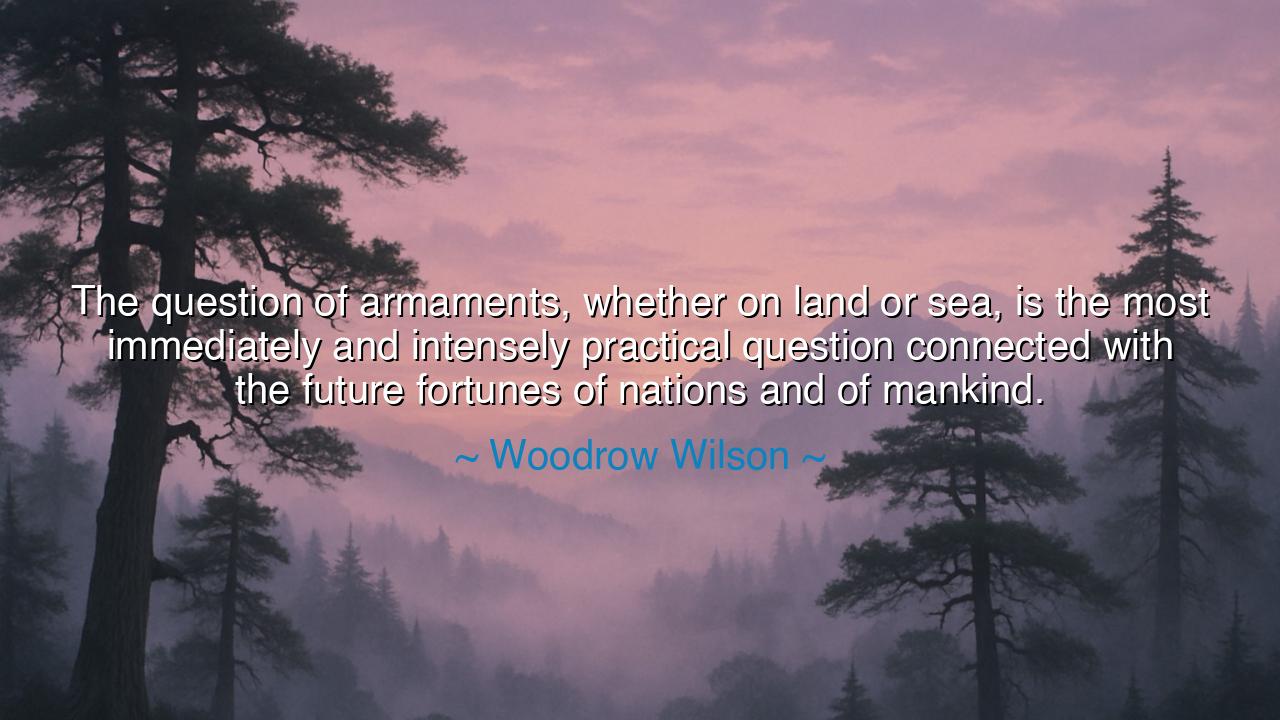
The question of armaments, whether on land or sea, is the most
The question of armaments, whether on land or sea, is the most immediately and intensely practical question connected with the future fortunes of nations and of mankind.






In the annals of history, there has always been a profound recognition that the security and future of any civilization is deeply intertwined with its capacity to defend itself. The ancients, whether in the great city-states of Greece or the vast empires of Rome, understood that the question of armament, the means by which a nation can protect its sovereignty, was essential to its survival and prosperity. Woodrow Wilson’s words, “The question of armaments, whether on land or sea, is the most immediately and intensely practical question connected with the future fortunes of nations and of mankind,” reflect this ancient truth. Just as the ancient philosophers spoke of the need for a nation to possess the strength to defend itself, Wilson points to the necessity of military preparedness as a key factor in shaping the future.
In the ancient world, armament was not simply a matter of physical defense, but a symbol of a nation’s will and resolve. The great Greek city-states like Athens understood that military strength was essential not only for defending borders but also for asserting their identity on the world stage. The Athenian navy, one of the greatest of its time, was not merely a fleet of ships; it was a symbol of Athenian might, a statement that Athens would not be easily defeated. In the same way, Wilson's recognition of armaments as a practical question speaks to the need for nations to be prepared for the challenges ahead, for a nation’s future is shaped not just by its ideals, but by its ability to protect those ideals through force if necessary.
Consider the Roman Empire, whose legions marched across vast territories, ensuring security and stability in the face of external threats. The Roman military was not merely a tool of conquest but the backbone of the Empire, allowing for peace and prosperity within its borders. Yet, even in its glory, Rome knew that the strength of its armaments was what kept it on top, for a time. Wilson’s words echo this understanding—the military power of a nation is essential not only for immediate defense but for securing the future of a civilization. Without such strength, even the greatest empires risk falling prey to the tides of time.
In the more modern context, World War I provides a stark example of how the question of armaments shapes the fate of nations. The war, a product of growing tensions and military buildups, demonstrated how the lack of military diplomacy and the rush to arm in the face of rising nationalistic fervor could lead to catastrophic consequences. Wilson, having witnessed the devastation of this conflict, understood that the future of mankind was no longer merely determined by the arms race, but by the choices nations made in the realms of defense and diplomacy. The Great War was fought not only with weapons but with ideologies, and it left the world irrevocably changed.
Yet, there is wisdom in balance—the recognition that while military might is necessary, it must be tempered with wisdom. The ancient Chinese philosopher Sun Tzu, in his Art of War, emphasized that victory is not simply about possessing the most powerful armaments, but about understanding the terrain, the timing, and the strategy behind their use. In this way, Wilson’s assertion about armaments is not just about strength but also about understanding how and when to wield that strength in a way that ensures the long-term security and prosperity of nations. Military power, when coupled with diplomacy and reason, can safeguard the future without leading to unnecessary conflict.
The lesson we take from Wilson’s words is this: the future fortunes of nations are inextricably tied to their military readiness, but that readiness must always be coupled with wisdom and thoughtfulness. Armaments alone will not determine the fate of a nation; it is how they are used, managed, and regulated that shapes the world’s future. This balance between strength and wisdom has been the cornerstone of many successful civilizations throughout history, from the Greek city-states to the Roman Empire and beyond.
In your own life, consider what you are doing to prepare for the future. Are you arming yourself with knowledge, wisdom, and resilience, so that you can face the challenges ahead with strength and clarity? Just as nations must be prepared for the inevitable trials of time, we, too, must build our own personal “armaments”—whether in the form of skills, wisdom, or relationships—so that we can shape our future with purpose and strength. Prepare today, not only for the immediate struggles of tomorrow but for the long-term journey ahead, so that, like the ancients, you may create a future full of peace and prosperity.






AAdministratorAdministrator
Welcome, honored guests. Please leave a comment, we will respond soon